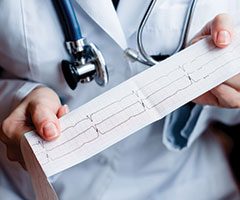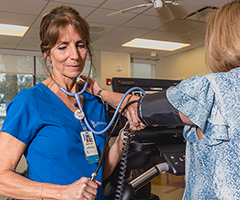Cardioversion
What is cardioversion?
Cardioversion restores a normal heart rhythm for people who have certain types of abnormal heartbeats or arrhythmias. It’s as easy as sending electric shocks to your heart through electrodes placed on your chest. Occasionally, your doctor may perform cardioversion using only medication.
The most common irregular heart rhythms that require cardioversion include atrial fibrillation and atrial flutter. Life-saving cardioversion also treats ventricular tachycardia (a rapid rhythm originating from the lower chambers of the heart).
Cardioversion is usually performed in a hospital, but you should be able to go home the same day as your procedure.
What happens during cardioversion?
A nurse or technician will connect you to several monitors that allow our health care team to check your heart rhythm and blood pressure during the procedure.
A nurse or technician will then insert an IV line in your arm to help you sleep during the procedure. Your doctor may also use the IV line to give you additional medications that can help restore your heart rhythm.
We then place several large patches called electrodes on your chest. The electrodes will be connected to a cardioversion machine (defibrillator) using wires. The defibrillator will record your heart rhythm throughout the procedure and will deliver shocks to your heart to restore a normal rhythm. This machine can also pace your heart if it beats too slowly after cardioversion.
While you are asleep, the doctor will use the cardioverter machine (defibrillator) to deliver specific amounts of energy to your heart through the cardioversion patches. The shock interrupts the abnormal electrical rhythm and restores a normal heart rhythm.
-
Cardiology - Heart Institute at Bass Road
-
Cardiology - Heart Institute at Cape Coral Hospital
-
Cardiology - Heart Institute at Coconut Point
-
Cardiology - Heart Institute at Medical Plaza One
-
Cardiology - Heart Institute at Metro Parkway
-
Cardiology - Heart Institute at Sanctuary
What is the recovery time after cardioversion?
You'll spend about an hour in a recovery room being closely monitored for complications. Your family may visit you in this area.
The procedure itself lasts only a few minutes. However, the preparation and recovery time for the procedure may add a few hours to your appointment. Please plan to stay 4 to 6 hours. You'll need someone to drive you home, and your ability to make decisions may be affected for several hours after your procedure.





















































































